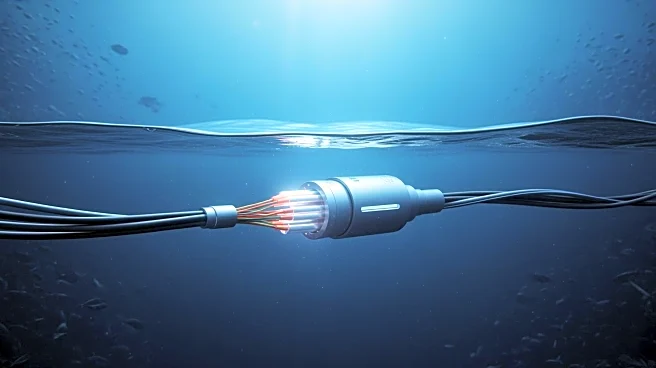What's Happening?
Vodafone Group and Vodafone Ukraine have announced the commencement of construction on a new submarine cable system, known as the Kardsea system, in the Black Sea. This initiative aims to establish a digital corridor linking Europe and Asia, with landing
points in Bulgaria, Georgia, Turkey, and Ukraine. The construction will occur in designated safe zones within Ukraine, amidst ongoing defense efforts against Russia's invasion. Subsea cable specialist Xtera has been contracted to design, construct, and install the Kardsea system, which is projected to cost approximately $100 million. Upon completion, the cable will provide over 500 terabits per second of internet capacity across the Black Sea region, addressing the increasing demand for connectivity driven by the expansion of 5G, AI, streaming services, and the Internet of Things.
Why It's Important?
The construction of the Kardsea submarine cable system is a significant development in global connectivity infrastructure, as subsea cables are responsible for carrying between 97% and 98% of international internet traffic. This project is crucial for enhancing digital connectivity between Europe and Asia, which is vital for economic growth and technological advancement. The increased internet capacity will support the growing number of mobile users worldwide, projected to rise by 12% by 2030. This expansion is driven by advancements in 5G technology, artificial intelligence, and the proliferation of streaming services and IoT devices. The project also represents a strategic move for Ukraine, bolstering its digital infrastructure amidst geopolitical tensions.
What's Next?
The construction of the Kardsea system is expected to proceed in phases, with ongoing assessments of safe zones in Ukraine to ensure the security of the project. As the cable system nears completion, stakeholders in the telecommunications industry will likely focus on optimizing the infrastructure to support emerging technologies and increasing data traffic. Additionally, the project may prompt further investments in digital infrastructure across the region, potentially leading to enhanced economic collaboration between Europe and Asia. The successful implementation of the Kardsea system could serve as a model for future connectivity projects in other regions facing similar geopolitical challenges.
Beyond the Headlines
The Kardsea cable system not only enhances connectivity but also represents a strategic geopolitical maneuver, reinforcing Ukraine's position in the global digital landscape. The project underscores the importance of digital infrastructure in national security and economic resilience, particularly for countries facing external threats. Furthermore, the collaboration between Vodafone and Xtera highlights the role of international partnerships in advancing technological progress and fostering economic development. As digital connectivity becomes increasingly integral to global commerce and communication, projects like Kardsea are pivotal in shaping the future of international relations and economic integration.
















